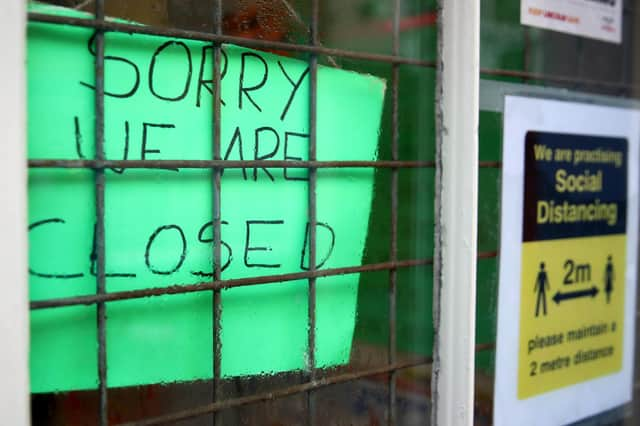UK economy suffers biggest slump on record... but avoids double-dip recession


However, modest growth in December means that the economy looks set to avoid what could have been its first double-dip recession since the 1970s.
The Office for National Statistics (ONS) revealed that gross domestic product (GDP) dropped by 9.9 per cent last year.
Advertisement
Hide AdAdvertisement
Hide AdThe slump marks the worst year for the UK economy since records began.
GDP was first measured in the aftermath of the Second World War, and the measure has never previously dropped by more than 4.1 per cent.
The last big drop was in 2009, but the Bank of England has also estimated historic GDP going bank centuries.
These measures come with caveats, but if correct, 2020 would be the worst year since 1921.
Advertisement
Hide AdAdvertisement
Hide AdIn December, the economy grew by 1.2 per cent, after shrinking by 2.3 per cent in November, as some restrictions eased, putting it on course to avoid a double-dip recession.
A double-dip means two recessions within a short period of time, while a recession is defined as two consecutive quarters where the economy contracts.
Ulas Akincilar, head of trading at online trading platform Infinox, said: “By the narrowest of margins, the UK kept its 2020 economic decline to single figures. But this forecast-beating figure is the hollowest of victories.
“The fact remains that this is Britain’s largest annual fall in GDP on record, and the UK’s contraction was worse than that seen in many of its EU rivals.
Advertisement
Hide AdAdvertisement
Hide Ad“Nevertheless behind the grim headline figures, there is plenty to cheer the ‘glass half-full’ brigade.
“The UK economy has now posted two successive quarters of growth. The collapse seen during the first half of 2020 has not been repeated, and output continued to expand in the final month of the year.”
Suren Thiru, head of economics at the British Chambers of Commerce, said: “Despite avoiding a double-dip recession, with output still well below pre-pandemic levels amid confirmation that 2020 was a historically bleak year for the UK economy, there is little to cheer in the latest data.
“Modest growth at the end of 2020 is set to be followed by a substantial fall in output in the first quarter of this year as the current lockdown, the unwinding of Brexit inventories and disruption to UK-EU trade flows combine to suffocate activity.
Advertisement
Hide AdAdvertisement
Hide Ad“While the vaccine rollout offers optimism, with the scarring caused by the pandemic likely to crystallise as government support winds down and the prospect of persistent post-Brexit disruption, any recovery may be slower than the Bank of England currently predicts.”
Jonathan Athow of the ONS added: “Loosening of restrictions in many parts of the UK saw elements of the economy recover some lost ground in December, with hospitality, car sales and hairdressers all seeing growth. An increase in Covid-19 testing and tracing also boosted output.
“The economy continued to grow in the fourth quarter as a whole, despite the additional restrictions in November.
“However, GDP for the year fell by nearly 10 per cent, more than twice as much as the previous largest annual fall on record.”
A message from the Editor:
Thank you for reading this article. We’re more reliant on your support than ever as the shift in consumer habits brought about by coronavirus impacts our advertisers. If you haven’t already, please consider supporting our trusted, fact-checked journalism by taking out a digital subscription: www.scotsman.com/subscriptions
Comment Guidelines
National World encourages reader discussion on our stories. User feedback, insights and back-and-forth exchanges add a rich layer of context to reporting. Please review our Community Guidelines before commenting.
